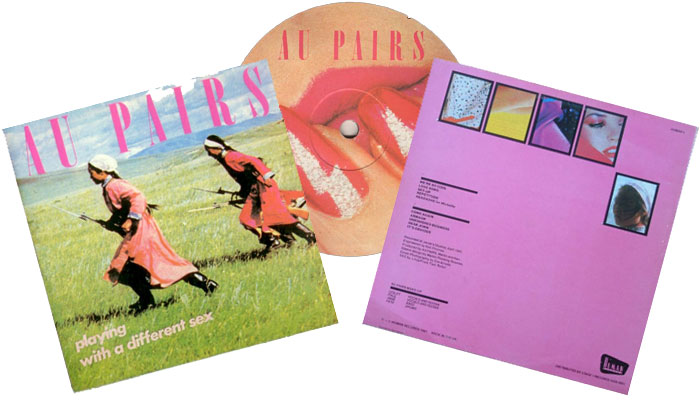Cable Ties’ Jenny McKechnie on Au Pairs – Playing With A Different Sex 

As far as new artists in 2017 go, I’d say that Cable Ties are taking top honors right now. In their home country of Australia they’re raking in accolades and topping out mid-year charts, a trend that should hopefully catch on worldwide if there’s any justice. The band’s Jenny McKechnie is pulling triple duty as a cultural force, playing in newcomers Wet Lips alongside the Ties and co-heading a new label, Hysterical Records, alongside Amanda Vitartas of Future Popes and Grace Kindellan of Wet Lips. While Cable Ties is a taut musical force in its own right, much of the credit must be given to McKechnie’s vocal prowess and biting lyrics, both of which have drawn comparisons to crucial feminist punk outfits like X-Ray Spex or Sleater-Kinney. As usual with Hidden Gems I’ve asked Jenny to pick a record that’s been a bit overlooked in her opinion and tell how it came into her life and impacted her music. She gives her take on the Au Pairs’ ever resonant debut Playing With a Different Sex below.
Out of the gate McKechnie gushes about the gem, “I only came upon the band and the record a couple of months ago but it has become one of my favorite albums of all time. I don’t know how it was missing from my life for so long,” she says. “In short – the album is a feminist, post-punk masterpiece. Lead singer and guitarist Lesley Woods writes about feminist issues with rare intelligence and incisiveness (which I will bang on about more later). There are some strong Gang of Four influences at play in the music and like all good post-punk, the songs hang off a simple and syncopated bass line. Incredibly, Jane Munro only started playing bass when the band formed in 1979. The drumming dances around the bass and the lead guitar is there doing exactly what the song needs it just the right spot.”
The record came to Mckechnie in a rather modern way, “Someone kept posting links to their songs on Cable Ties’ YouTube videos,” she says, “I have since learned not to read the comments. However, I’m glad I followed this one up. The comment maker must have thought we were influenced by or sounded like them which is very flattering (but not very accurate). I’ve been absolutely flogging the album ever since.”

Given some time to ponder on the album, Jenny breaks down why this is such a vital piece of the feminist punk pantheon. “The record isn’t entirely hidden,” she admits. “It has popped up on a handful of ‘essential post-punk’ compilations and a few feminist punk/ rock compilations. However, I am astounded that it is not more prominent in these spaces. My completely unscientific and entirely baseless ~survey of feminist punks I know~ yielded only one positive response. Everyone else had never heard of the band or the album (but they were bloody stoked on it after I sent it to them).”
“The band broke up soon after releasing their second album Sense and Sensuality. Perhaps they didn’t have the longevity to be kept in the collective memory.” “Still,” says McKechnie, “I don’t understand why Playing With a Different Sex doesn’t appear on a bunch of lists next to Siouxsie and The Banshees, Gang of Four and The Slits. A few of the articles I’ve read about Lesley Woods indicate that she was very forthright and outspoken on politics and feminist issues (which makes me love her even more). Woods’ commentary on issues of sexuality and power dynamics in both hetero and queer relationships features heavily on the album. It takes a few listens to hear and understand the depth of her analysis – but it’s worth it.”
McKechnie expands on Woods’ impact, “I won’t be able to go into detail on every song but a stand out for me off the album is ‘Armagh.’ The song talks about the torture of 32 Irish Republican women imprisoned in Armagh in Northern Ireland during The Troubles. It also mentions America’s hand in the torture of Iranian prisoners and the Vietnam war. The song’s refrain ‘we don’t torture, we’re a civilized nation’ is exposed as a lie in mouths of British and American western democracies.
“If only we could listen to this song as a relic of the past with no parallels in our society some 36 years later. I’m sure you can all think of plenty of contemporary American examples. In Australia, we illegally detain refugees arriving by boat in prison camps on Nauru and Manus Island. We’ve been condemned by the United Nations, Amnesty International and many other human rights organizations countless times because of them. Recently, it has also come to light that there has been pervasive incidents of torture of children in youth detention centers across Australia.”
“It is a testament to Woods’ incisive and progressive lyricism,” she continues, “that most all of the songs on the album still have a pertinent political message for today’s audience. Depressingly the album also highlights the fact we still have a lot of work to do before women are counted as cultural equals not just legal equals – which Woods so perfectly sums up in the closing track of the album ‘It’s Obvious’ with the line ‘you’re equal but different.’ Musically the album is driving and urgent. It contains my favorite bass lines of all time. Even without Woods’ exceptional lyrics and vocal delivery, it is an album I would love and have on repeat in the living room.”
As for the album’s impact on her own writing she admits, “As I only discovered it after we’d written the last record it hasn’t had a chance to seep into my own music yet. I am sure that it will as both bands write their next albums. In Cable Ties, the fearlessness with which Lesley approaches her song writing and her defiant public persona are what will influence me more than the music itself. We don’t do much of this syncopated, staccato type of post-punk and prefer a more hypnotic, repetitive style.
Wet Lips are starting to take things in a different direction since Georgia replaced Mohini on the drums. I think Jane’s bass playing is definitely seeping into my new Wet Lips bass lines. As I’m doing a heap of touring at the moment I haven’t had a chance to do much writing but every time a pick up the bass Jane’s in the back of my mind.”
Similarly, Cable Ties and Wet Lips albums resonate over here and don’t often leave the speakers, and it’ll be great to see how both bands develop. If you haven’t checked out either, both are very highly recommended. If you’re in Australia, Cable Ties just wrapped up a national tour and hopefully you got a chance to see them live. Hopin’ that someday we get a chance to see them in the States as well. And, if you haven’t got your hands on the Au Pairs debut yet, I’d say that Jenny’s recommendation should more than perk up some interest. There have been a few reissues over the years, but currently you can pick up a decent version from Sanctuary.
Support the artist. Buy it HERE.








